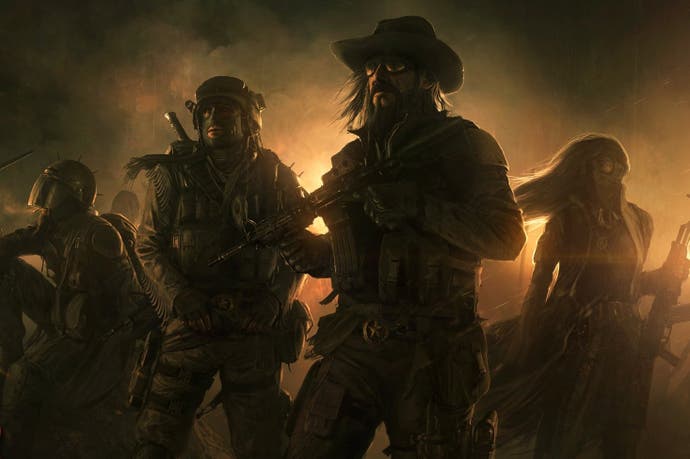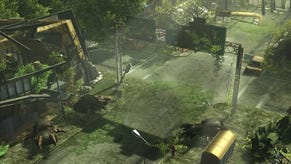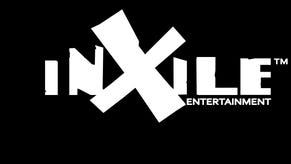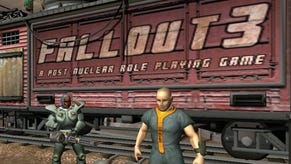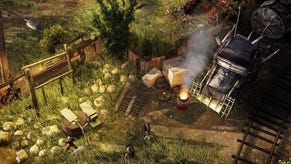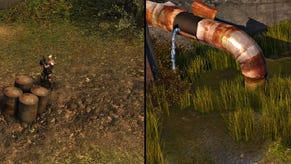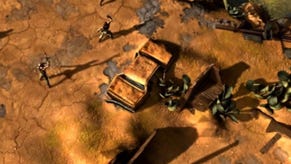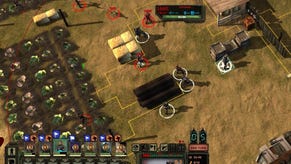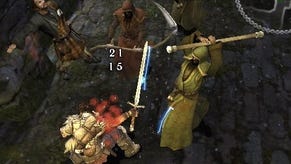Wasteland 2 review
Nuclear winner.
26 years is a hell of a long time to wait for a sequel, though it's arguable that Wasteland 2 is as much an alternate Fallout 3 as it is the continuation of the original post-apocalyptic role-playing game. At the very least, it's the two branches of the family tree finally wrapping around each other. Here, Wasteland's more whimsical apocalypse and tongue-in-cheek style - where you're as likely to face giant mutated rabbits and toads as radioactive scorpions - meet Fallout's combat, exploration and interface. Also its feel. And its moral choices. While original Wasteland was definitely this game's alma mater, it's obvious where it got its PhD.
Old schools don't get much more compatible though, and Wasteland 2 wastes little time carving out, or reclaiming, its own identity. It's a party-based game from the start, with your four-man team a group of Desert Rangers sworn to defend the people from the raiders and robots and monsters that plague their lives. From your radio you find out about trouble in need of troubleshooting, often literally, care of returning character Vargas, and then you go where you're needed rather than simply stumbling around.
Your badge is both a symbol of hope - albeit one tarnished of late by the Rangers' less-than-stellar ability to get things done - and a target on your chest guaranteed to draw the worst of the Wastes' attention. In Arizona, your job is largely to make it mean something again while repairing radio towers to get a fix on an incoming threat with a personal grudge against the Rangers. Later, in California, it's to make it a symbol for good in new territory and stop that threat as time permits.
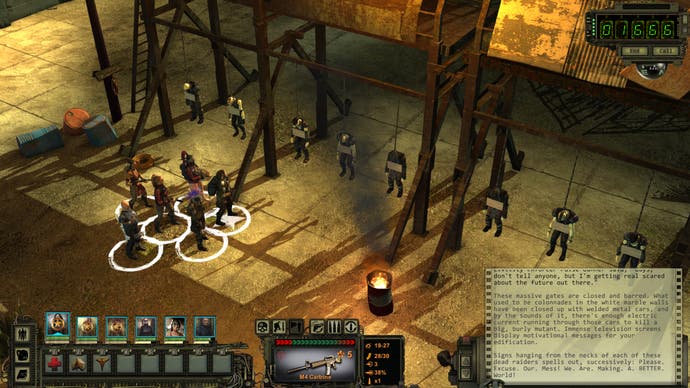
The story is pure pulp and the big picture is not that exciting, but as usual, the charm of Wasteland is in the stops along the way: location after location full of crazy characters and moral choices, and a writing team gleefully embracing the ability to do pretty much whatever they want. A canyon of suicide-bombing monks devoted to a nuclear weapon god that they actually have access to. Disco robots. Scaring off bandits by threatening first to shoot their dog, then to eat their dog.
The humour is black as obsidian much of the time, but very knowingly so. A deposed mayor in a cage, for instance, contemplates that inviting a gang called the Leather Jerks into his town was, in retrospect, a bad idea. A tax-collecting enemy gets a unique set of barks like "Assessor VanOverbake shoots Cherry Bomb and makes a note to charge her for the bullet." Accidentally triggering a nuclear device in the middle of Ranger Citadel is summed up with a simple "Ooops." Rarely does too much time go by without something amusing happening.
Throughout, it's a game that uses text to great advantage, pushing descriptions far more nuanced than any graphics could allow, and full of great conversations unfettered by the need for voice acting. There's some of that, but it's used sparingly for key characters and moments, like hearing the fall of a settlement you had no choice but to leave to its fate, or the voices that come in on the radio. Some come from Rangers on their own missions (though, sadly, nowhere near enough of those - the early game is lonely), while others come from the various factions after a piece of the world. They might be open about it, like a religion of robots; they might be charming about it, simply inviting a community to enter a lottery where third prize is a lifetime slavery. Either way, there's never a shortage of jerks in need of a visit from some nuclear cowboys.
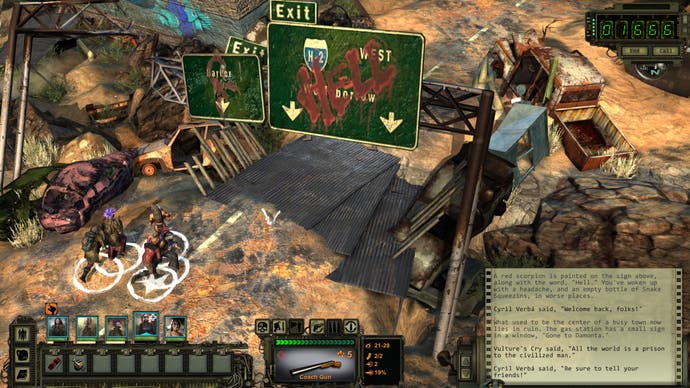
The world itself can be a somewhat sparse place, with less popping up on the map than I was expecting, but there's a good sense of variety. It's a refreshingly green apocalypse compared to Fallout's, with swamps and nature reclaiming the land, and outright verdant areas like farms. Each area has something like Damonta's airplane graveyard or the Prison's patrols to make it stand out - a Prison owned by the vicious Red Skorpion Militia, now mid-way through transforming themselves into a corporate entity with taxes, slavery, and a territory newly renamed "Happy Valley."
Needless to say, you have to fight a lot of people, and many factions are hostile to the Rangers by default. There are, however, often diplomatic solutions to problems, from paying a toll to simply doing someone a favour, with a number of quests having knock-on effects. Save some travellers and they'll probably show up later; fail to stop a man's house burning down, and he's not going to support a pro-Rangers Mayor in a later vote.
Combat is ultimately unavoidable, though, and it's one of Wasteland 2's least interesting things (the least interesting of all being how often you have to scour the maps looking for tiny objects and objectives). Combat is turn-based, and fine, but limited to ducking behind cover, switching on overwatch to get pot-shots when enemies get close, and only occasionally breaking things up by landing an opening hit or throwing a grenade. There's no locational targeting save a double-or-nothing headshot option, and your guys are each going to be using their specialist weapon most of the time, upgrading it when the next tier appears. There's really not much to it and it quickly becomes more a chore than a challenge.
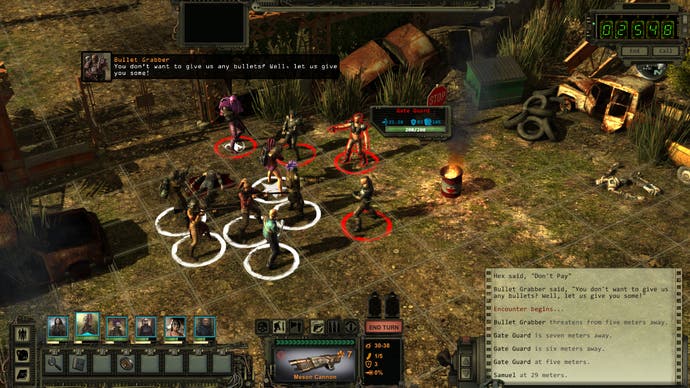
This is especially notable coming to Wasteland 2 from Divinity: Original Sin - which, admittedly, has it a bit easier by being able to splash magic and monsters around, but still set a standard by which this game feels distinctly weak. Here, you have the same basic handful of fights every time, slowed down only by bad luck with jamming guns and the regular need to trudge back to a base for medikits and ammo. There's no saving in fights - which can be very long indeed, especially if you make enemies of a whole faction - and your party members can die for real, after which it's reload time. There aren't enough recruitable NPCs to fill their slots and you need a full team to handle the number of enemies around, as well as for skills like lock picking, surgery, and toaster repair. That's not a euphemism. There are toasters. Broken ones.
Now, all this is certainly true to the old-school brutality that Wasteland subscribed to back in the 90s. So is the number of random crates booby-trapped for no reason but to give Perception characters something to do, and that's a bloody nuisance too. Also irritating, though thankfully less common, is dealing with the AI of your followers. You control your own team, every second, every move. You can also recruit NPCs who will be variably loyal and have their own objectives, but who will mostly obey orders and only occasionally go rogue (based on your Leadership stat). Quest followers, though, have a tendency to be unruly, suicidal and flimsy -and of course there's no option to say, "You, stick your face in the small of Bear's back and don't look up until we're home."
Wasteland 2's issues are hardly going to be deal-breakers for its primary audience - an audience for whom the first town, Highpool, can get away with being little but a string of callbacks to a game that's nearly three decades old. For newer players, while its definition of an 'easy' difficulty level should be taken with a pinch of both salt and cordite, it's not without sympathy or mercy. There's much more guidance and direction given than in the RPGs it harks back to, there's a configurable auto-save system, there are a wide range of preset characters to avoid creating a useless party, and there's an economy in which you're never poor as long as you've got a bag of dildos, old game consoles and empty cat litter bags... which is all the time, obviously. Inventory management is also very easy thanks to categorisation and a handy "Distribute All" button that automatically gives everyone the guns and ammo they use during looting.
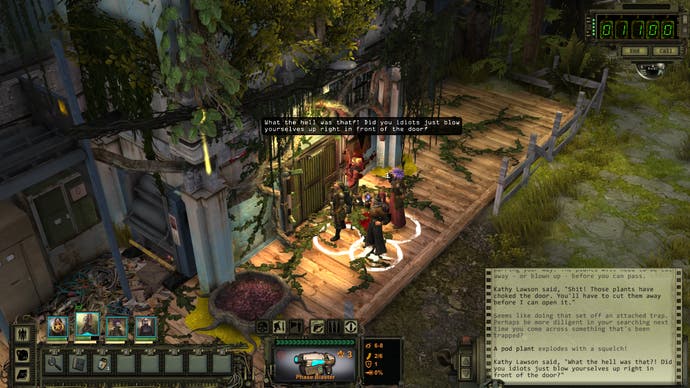
That said, there are some definite frustrations for players of all skill levels, including the inability to add notes to the map, the lack of map markers, mission objectives not always being clear, the pointless ability to type in conversation options that not once gave me anything but a variant on "Huh?", and the necessity of creeping around the map to avoid a bad combat initiation. That often makes exploration a real slog, especially when you start coming across enemies like sharpshooters and distance-closing robot drones. It doesn't help that there's not much music most of the time, and much of it is just ambient.
These mostly minor issues aside, Wasteland 2 is a great sequel. It's very clearly made with love to be true to the original game while still learning from the games that followed. In going for something so unapologetically old-school it does sacrifice the ability to do anything new with the format, as Divinity: Original Sin managed to do in many ways; that game's flexibility does arguably make it the better of this year's two old-school, turn-based computer RPGs. This hardly matters, though, because if you like one you're almost certainly going to like the other. Both are great games that set out to stick their fingers in the same quivering part of your brain and make it throb like it's the 1990s. Choose magic, choose a shotgun, or better still, find time for both; computer RPG fans haven't had it this good in ages.
